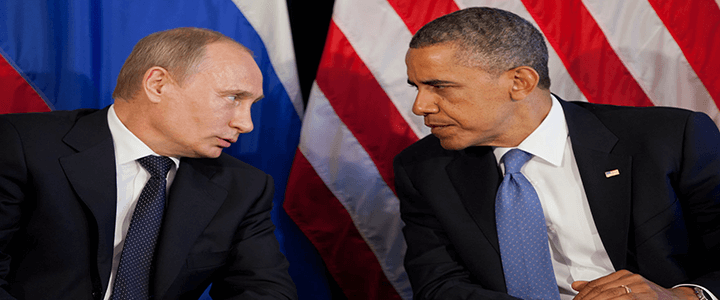On Sunday, both the Russian and U.S. governments confirmed that the Central Intelligence Agency had shared information with the Russian government regarding “a major terror plot in Saint Petersburg.” (Russia, not Florida). Russian President Vladimir Putin, who first revealed the cooperation, called President Trump on Sunday to thank him for the information.
“Based on the information the United States provided,” the White House said in a readout of the call, “Russian authorities were able to capture the terrorists just prior to an attack that could have killed large numbers of people.”
Russian news agency Tass reported that based on the shared intelligence, the FSB, Russia’s state security service, arrested seven members of an Islamic State cell. They were planning “bomb attacks in St. Petersburg’s Kazan Cathedral and in other crowded places,” according to Tass. News of the arrests no doubt unsettled St. Petersburg residents. Recall that on April 3, a 22-year-old Kyrgyzstan-born Russian citizen with ties to radical Islamists detonated a bomb in the subway there, killing 14 and injuring 51.
every day diplomacy
The president’s opponents are always quick to point out that he’s reluctant to criticize the Russians for anything. The day this news broke, the Washington Post was touting an exposé charging that the president “continues to reject the evidence that Russia waged an assault on a pillar of American democracy and supported his run for the White House,” thus leaving him blind to the Russian threat.
So it’s natural that they would assume this is just another example of the president “helping his buddy Putin.” Take my advice: save your sanity and stay away from the comments section of any Trump-related article online. These people see more Russian spies in the U.S. than Joseph McCarthy.
the real russia problem
Russia has certainly not been a friend to the United States recently. Even putting aside the 2016 election information operation targeting American voters, there are a number of other recent incidents that remain troubling. The most recent was on Friday, when two F-22 Raptor fighters of the U.S. Air Force were involved in a 40-minute encounter with two Russian Su-25 “Frogfoot” close air support aircraft over Syria. The Russian jets had crossed the Euphrates River, which is the “de-confliction line” used to divide Russian and American-controlled airspace.
The U.S. Central Command confirmed that one of the Russian aircraft “flew close enough to an F-22A that it had to aggressively maneuver to avoid a midair collision.” The Raptors fired flares and chaff as a warning to the Russians. These types of harassing encounters are dangerous and inexcusable.
But to say that the sharing of intelligence regarding an imminent threat to civilians of any country is either a payoff to that country’s leader or a cynical ploy for attention is simply out of bounds. Despite the abysmal state of U.S.-Russian relations during the Obama administration, the Russian government warned U.S. intelligence about the possible radicalization of Tamerlan Tsarnaev, one of the two (also Kyrgyzstan-born) brothers responsible for the Boston Marathon bombing.
Sharing this kind of information—information that will save lives—is what intelligence agencies do. It’s what civilized countries do. There are plenty of reasons to be upset with Russia. But none of them would justify sitting on this kind of information. And nothing justifies the cynicism of those who disbelieve it, either.


